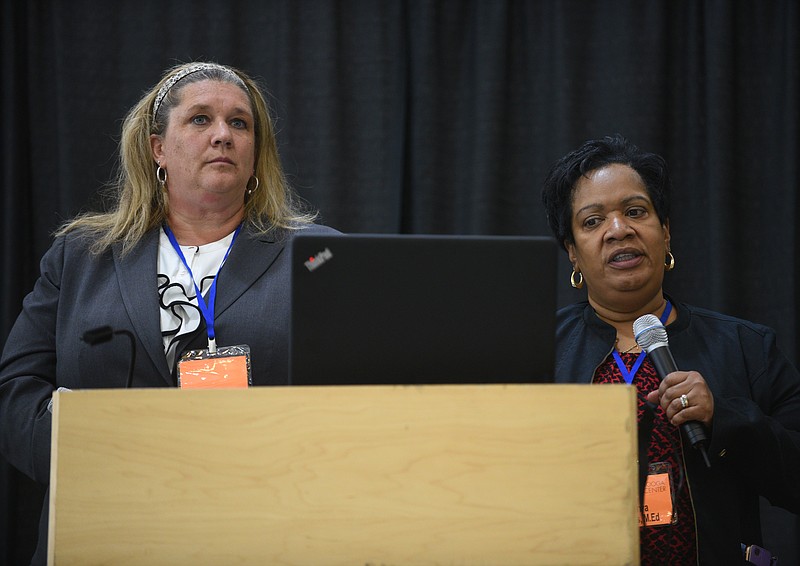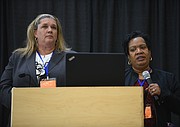Flipping through the pages of her daughter's yearbook, Debbie McAdams realized there was no longer a page dedicated to a special education class.
McAdams, director of exceptional education for Metro Nashville Public Schools, said this is the moment she realized the significant strides the district was making to include students with disabilities in regular classrooms.
"We did it! We did it!" she told those gathered for a Chattanooga Autism Center conference on Friday.
McAdams, along with Sonya Dobbs, disability services coordinator for Metro Nashville Public Schools, gave the keynote address at the eighth annual conference, talking about the drastic changes the district has made in recent years to include a majority of students with disabilities in regular classrooms with the additional supports they need to be successful.
National research shows including students with disabilities in regular classrooms with appropriate support benefits all students, and helps close the achievement gap - and Nashville is seeing this happen, McAdams said.
Before the district started transforming its approach to special education in 2009, Nashville schools as a whole had one of the lowest percentages of students with disabilities in general education classrooms in the state, and large achievement gaps between those groups of students.
Students with disabilities in Nashville were often segregated from their peers and moved to schools across the county where the specific services they needed were provided, which happens to many students here in Hamilton County.
But Dobbs said Nashville realized it needed to make a transformative change to the way it educates students with disabilities.
"It's a civil right," she added.
With the help of parents, community members and educators, Nashville started changing policies and practices. The district began requiring every school to offer a full continuum of services for students with disabilities and focused on including students in regular classrooms as much as possible with the proper supports.
Now more than 70 percent of students in each disability category are receiving meaningful instruction in general education classrooms at least 80 percent of the day, Dobbs said. Students are also receiving specialized instruction, as needed, at whatever school they attend.
In Hamilton County public schools, about 80 percent of students with intellectual disabilities are separated from nondisabled students in Comprehensive Development Classrooms for most of the school day, according to data from the Tennessee Department of Education. Standardized testing data from 2015 shows that in each tested subject, students with disabilities trailed their nondisabled peers by about 30 percentage points.
Dobbs and McAdams told the parents, educators and people with autism gathered at the conference that it hasn't been easy for Nasvhille Schools to make this progress. They noted the need for in-depth professional development for every educator in the district, the time it took to train principals how to make their school's schedule work for students with disabilities and how the district had to rework the way it filled out plans for special education students.
Dobbs said the district still has work to do and places where it needs to do better, but encouraged the room of educators, parents and people with autism that fighting for inclusion is worth it.
"It benefits all students," she said.
More than 700 people attended the conference and spent a majority of the day in smaller seminars where 37 speakers discussed a variety of topics tailored for educators, people with autism and parents. Attendees also got to visit dozens of vendors that provide different services, training and equipment for people with disabilities.
Callie Stewart, assistant principal at Apison Elementary, attended the conference with some of her staff. She said the conference offered great training for educators on best practices and strategies.
"We want all of our children to be successful," she said.
Stewart said she thinks Hamilton County Schools is moving in the right direction in how it approaches special education. If appropriate, all students should have access to general education classrooms and get the support they need, she added.
Merissa Waldron drove to the conference from Murfeesboro, Tenn., as she has a 17-year-old with autism and was wanting to learn more about how to help her transition to more independence.
It was Waldron's first time attending the conference, and said it was encouraging and helpful to be around other people who are in similar situations.
"It's been really fantastic," she said. "I'm just learning a lot."
Contact staff writer Kendi A. Rainwater at krainwater@timesfreepress.com or 423-757-6592. Follow her on Twitter @kendi_and.

